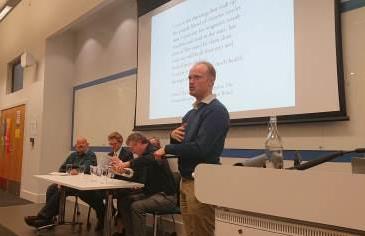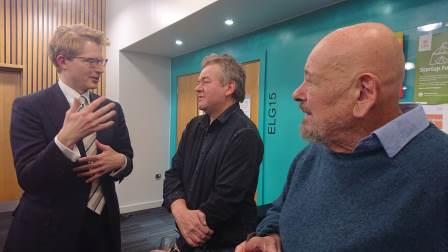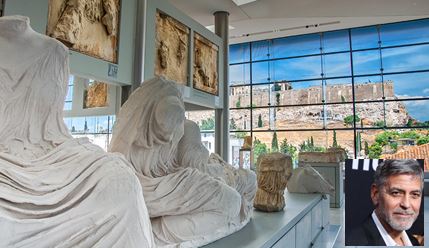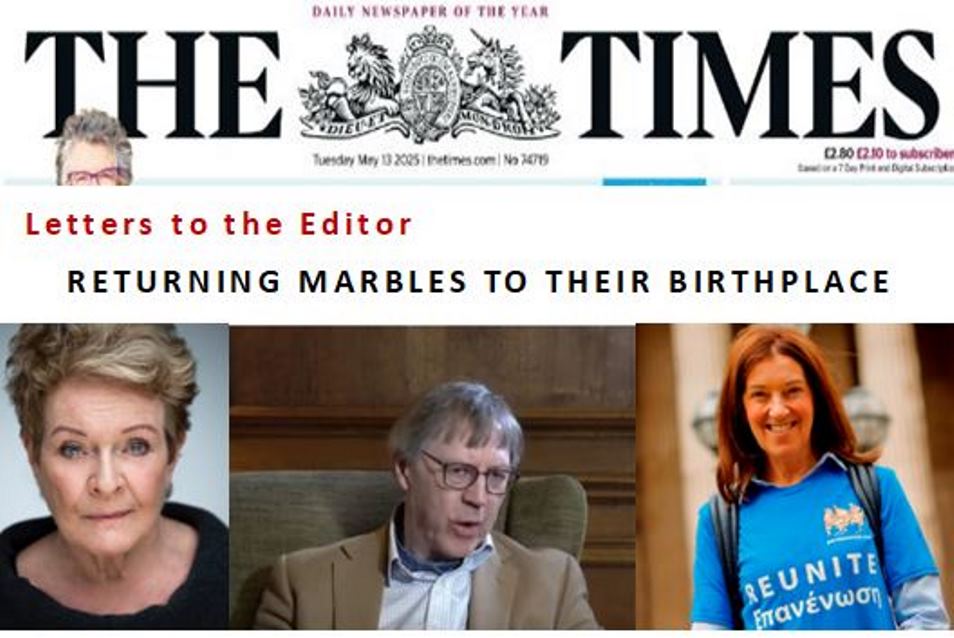09 October 2019, City of London University Seminar
The Parthenon Marbles - Can An Amicable Settlement be Found?
Panel :
Dr Tatiana Flessas (LSE)

Dr Florian Schmidt-Gabain (Attorney, Zurich, Lecturer in Art Law, Universities of Basel and Zurich)

Jonathan Jones (The Guardian)

Professor Oliver Taplin (BCRPM, University of Oxford)

Moderator: Dr Luke Mcdonagh (City, University of London)

When 200 years plus have passed without a solution to the division of a peerless collection that makes up the survivig sculptures from the Parthenon, there is a need to hear from those that look at such matters with an open mind and to explore a way forward.
For those gathered at City University London on Wednesday 09 October, the hope was plentiful.
The seminar included:
‘An Introduction to the Historical and Legal Issues Surrounding the Parthenon Marbles’
Dr Tatiana Flessas (London School of Economics)
‘A Proposal for an Amicable Settlement for the Case of the Parthenon Marbles’
Dr Florian Schmidt-Gabain (Attorney, Zurich, Lecturer in Art Law, Universities of Basel and Zurich)
Dr Florian Schmidt-Gabain's presentation spelt out the lack of any meaningful discussion continued to yield no solution and we might be organising such events for many more years to come. To move beyond that binary nature of the discussion and examine possibilities for a compromise solution is conceivable, namely a division of individual items between Greece and the United Kingdom could be such a solution. But, of course, a compromise solution is not only a possibility because the possibility of a compromise exists, but also because both the United Kingdom and Greece can bring forward good arguments for why the Parthenon Marbles should either stay in London or go back to Athens.
The panel discussion included a short explanation by Prof Oliver Taplin as to why reunification was sought with as much conviction today as when the first request was made in 1833 but more so in the last decade with the opening of the Acropolis Museum. Jonathan Jones also added to the panel discussion his continued support to keep the sculptures divided between two museums, yet how he veers towards reunification every tme he visited the Acropolis Museum. Dr Luke Mcdonagh moderated and then opened the floor to the audience for Q&A.
There were just a few hands at the end of the seminar in support of a compromise along the lines described by Dr Florian Schmidt-Gabain but perhaps fewer than had the compromise been along the lines of the proposals Greece has made to the British government and the BM before the Acropolis Museum was opened, and since then too. Room for compromise is there but the most telling observation during this discussion is that the BM insists on Greece acknowledging the BM’s ownership of the marbles and it knows that is something Greece can never do. Catch 22. While that remains the case there can be no movement whatsoever towards useful discussions, and unless the Trustees start a meaningful debate amongst themselves, we are in stasis.
So what next?
Dr Tatiana Flessas showed us a map of Europe that included western and eastern parts with the changing borders through the centuries, a reimnder that at the time of Lord Elgin's actions, Greece was not an independent state and not in authority - one of the key reasons why it is impossible for Greece to acknowledge the BM's ownership. Tatiana also reminded us of the law and that we must all appreciate that it may not provide the right vehicle to end this high profile cultural dispute. She asked us to reflect on the fact that legal tools do not reach the root of this conflict.
Without a doubt the panel and the audience would be encouraged to hear that bilateral discussions and mediation might take place - sometime. As Dr Florian Schmidt-Gabain stressed that such discussions would be over a long period and need for both parties to come to the talks with open hearts and minds. He acknowledged that Greece's strategy to date had not worked and that the UK's standing on this issue was very poor internationally. He mentioned the need for political decency. He spoke of both sides coming together and working on a three tier wish list, with non biased motivation he is suggeting that both parties will be motivated to move on, and by the third stage also reduce the number of artefacts that both sides would argue about. He also stressed the need for diplomacy and for the talks to take place privately without recourse for huge media hype or coverage. He also spoke of an eternal touring exhibition that would tour the world with some parts of the disputed Parthenon Marbles. He ended, by reminding us that compromise was invented by the Greeks.
Currently, the mindset of the BM remains firm and no further discussions will take place until Greece acknowledges ownership, something the BM knows full well Greece cannot do. For the BCRPM and many more campaigners, Greece's ask is wholly justified. Greece's Prime Minister Mitsotakis took the opportunity of a French state visit in September to ask President Macron for a loan from the Louvre for the 2021 celebrations taking place in Greece. A similar request to the UK was featured in an article by Helena Smith in the Guardian.
Professor Taplin reflected when the sculptures were made, they were an integral part of a building, the Parthenon, which still stands, proud and glorious on the Acropolis. And a timely reminder also for all those that appreciate heritage and culture, that the case of these sculptures is simply unique and that the Parthenon Gallery in the Acropolis Museum is the one place on earth where it is possible to have a single and aesthetic experience simultaneously of the Parthenon and its sculptures. He went on to say that over these last three years, when visiting the Acropolis Museum, he felt a great sense of shame seeing the plaster casts next to the orginals that Lord Elgin left behind.
For admirers of sculptures such as Jonathan Jones, the fact that when he visits Athens, he can 'see' the merit for reunification, we as BCRPM would add, isn't it time to allow all visitors to do the same and appreciate the moral argument made a difference - at the same time, Greece generous offer still stands.

Dr Luke Mcdonagh summing up the panels contributions and looking to the audience for their questions

Dr Florian Schmidt-Gabain a keen advocate for compromise with discussions behind closed doors and no publicity.





Comments powered by CComment